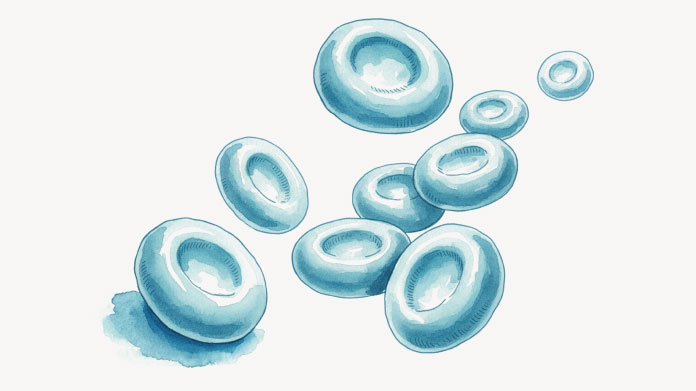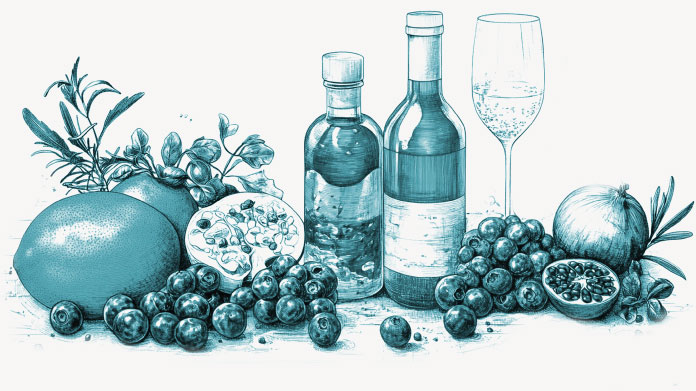Chronic inflammation: a review in 10 key points
Inflammation is a mechanism used by the body to respond to harmful stimuli. But when that response is excessive, the body suffers. Here, in 10 points, are the essential facts.

Put simply, the body cannot do without inflammation: it’s one of its primary defence mechanisms. However, it can sometimes be over-expressed, with harmful effects. When that happens, it’s called chronic inflammation: the body is no longer able to control its own response, resulting in potentially serious consequences. Here, in 10 points, are the essential facts on chronic inflammation.
Inflammation is a natural and beneficial process
Indeed, it’s one of the body’s key defence mechanisms against attack, whether mechanical (injury, wound) or microbial (infection). Sometimes, it may even be auto-immune, where the body attacks itself.
What are the normal mechanisms of the inflammatory response? When the body is under attack, chemical signals are transmitted which cause blood vessels to dilate and allow immune cells to be carried to the relevant area: it is these cells which will actively combat the source of the attack. This response produces the typical symptoms of redness, heat, swelling and pain, sometimes throbbing (a pulsating sensation at the site of the inflammation). This inflammation is thus an immune reaction, and is often sufficient to deal with the attack.
Excessive inflammation has several possible causes
If the attack is on-going, so too is the inflammation. It might come from external factors such as excessive consumption of alcohol resulting in sustained inflammation of the liver (cirrhosis). Air pollution and smoking produce inflammation in the lungs, as do bacteria such as mycobacterium paratuberculosis , which causes the chronic inflammatory disease tuberculosis.
Certain types of genetic disposition can also result in inflammatory diseases, for example, ankylosing spondylitis. There are auto-immune diseases too, such as lupus and psoriasis which are particularly characterised by chronic inflammation. It’s also believed that obesity and metabolic syndrome, the latter being a combination of cardiovascular risk factors (notably hypertension, high cholesterol and high blood sugar levels), are contributory factors to the development of chronic inflammation in the body (1). Stress and a sedentary lifestyle may also play a role in its onset.
There’s a link between chronic inflammation and mental health problems
Scientists have shown that inflammatory factors also affect the central nervous system. Persistent inflammation can impair neuron function. Certain psychiatric conditions such as depression, bipolar disorder, and even schizophrenia, as well as the developmental disorder autism may thus be affected by an increase in inflammation. These discoveries add weight to the idea of treating chronic inflammation in order to offer relief to patients suffering from psychiatric problems (2). In the case of depression specifically, inflammation is increasingly cited as a source. Inflammatory substances such as cytokines also produce molecules that are toxic to the nervous system, and reduce production of hormones such as mood-regulating serotonin, low levels of which are a cause of depression. Chronic inflammation may thus increase the likelihood of becoming depressed (3).
Which diseases are characterised by chronic inflammation?
Chronic inflammatory diseases are long-term disorders. They include inflammatory bowel diseases (ulcerative colitis, Crohn’s disease), psoriasis, multiple sclerosis, sarcoidosis, osteoarthritis and related conditions (rheumatoid arthritis for example)...
Chronic inflammation is also a factor in numerous other disorders: obesity, diabetes, acne, and fibromyalgia…
Often, chronic inflammation is silent and symptom-free
Unlike the acute form, chronic inflammation may progress silently and thus be asymptomatic. You may suffer from an inflammatory disease without realising it – that’s certainly the case for diabetes, aortitis and some forms of arthritis …
Sometimes symptoms do exist but they are not distinctive, such as extreme fatigue or digestive problems. It’s only later, therefore, that the acute symptoms of inflammation like pain manifest, at which point treatment is often more extensive. These rather vague, early symptoms can mean we can’t see the wood for the trees and blood tests are necessary to properly identify inflammatory problems. .
Food plays a key role in inflammation
It’s often said that diet is the first remedy! But this works in reverse too: a poor diet destabilises the body. Eating too many simple carbohydrates (fruit sugars, added sugars) and ‘bad’ fats, along with too little fibre, produces an inflammatory response in the body. It’s therefore sensible to reduce your consumption of ready meals, cured meats and even dairy products. In terms of sugar, it’s best to avoid cakes and pastries, sugary drinks and refined flour …
In addition, the links between inflammation and intestinal balance are now well-established. Our gut flora is made up of trillions of non-pathogenic microorganisms which are essential for maintaining equilibrium in the body. A decrease in microbiota results in a general imbalance, especially at an inflammatory level. And in 20% of cases, inflammatory bowel diseases develop into bowel cancer (4). Stabilising gut flora thus constitutes a promising option for treating numerous diseases.
The links between chronic inflammation and premature ageing
If the risk of chronic inflammation increases with age, it’s also the case that chronic inflammation causes premature ageing. So much so that a new word has been coined to describe it: inflammaging (5). We know its adverse effects on the body’s overall function, which accelerate the natural ageing process. This is particularly so in the case of diseases such as diabetes or age-related macular degeneration (AMD). But we also know that chronic inflammation affects the skin: it reduces cell renewal and results in a slackening of skin tissue as well as wrinkles!
What role does exercise play?
Regardless of the inflammatory disease, taking regular, moderate exercise has beneficial effects. As it does for the body as a whole. Engaging in physical activity at this level considerably reduces the production of proinflammatory cells. 20-30 minutes a day is enough to benefit from exercise’s anti-inflammatory effects! And the good news is that a brisk walk counts as physical activity (6).
It’s important, however, to be sensible, particularly if you suffer from arthritis or inflammatory joint diseases in general. Certain sports can exacerbate arthritis, particularly those that are high impact or involve twisting, such as tennis or team sports (7). Activities like cycling and swimming are a better choice. It’s always wise to consult your GP to find an activity suited to high-risk inflammatory diseases.
Obesity is an inflammatory disease
The connection between obesity and inflammation is one that poses a risk to health. Obesity promotes chronic inflammation, but the reverse is also true. Chronic inflammation promotes insulin resistance. When the body is no able to use insulin properly, blood sugar levels skyrocket. It’s a vicious circle. What’s more, excessive food intake exhausts our metabolism. The mechanisms of elimination give way to those of storage: sugar in muscles and the liver, and fats in adipocytes. These cells increase the inflammatory response, maintaining the circle. Treating inflammation is one of the most widely-studied approaches in the area of excess weight and obesity.
Natural solutions are available for controlling inflammation
As we’ve said, a balanced diet is essential for preventing chronic inflammation. Certain foods are especially recommended for their anti-inflammatory action. Turmeric (curcuma) for example, has been shown to act on several inflammatory mechanisms (8). Blackcurrant is also recognised for its anti-inflammatory properties (9), as are cranberry, blueberry and goji berry(10). In terms of dietary supplements, certain substances have demonstrated significant anti-inflammatory benefits.
One of our supplements combines the very best of them (curcumin, bromelain, gingerols, quercetin, rutin…) and also contains three patented ingredients of exceptional quality (Perluxan®, 5-Loxin® and Bioperine®): InflaRelief Formula. With its range of ingredients and broad-spectrum action, it provides effective support for combatting the ‘silent enemy’ of inflammation and fighting its many mechanisms.
Conclusion
Chronic inflammation is characterised by complex mechanisms, some of which have yet to be clarified by the scientific community. If you suffer from a chronic inflammatory disease, it is vital to follow the treatment advised by your doctor. In terms of prevention, a balanced diet and regular exercise are the primary measures for fighting inflammation.
References
- Cancello, R. and Clément, K. (2006), Review article: Is obesity an inflammatory illness? Role of low‐grade inflammation and macrophage infiltration in human white adipose tissue. BJOG: An International Journal of Obstetrics & Gynaecology, 113: 1141-1147.
- Pape K, Tamouza R, Leboyer M, Zipp F. Immunoneuropsychiatry - novel perspectives on brain disorders. Nat Rev Neurol. 2019 Jun;15(6):317-328.
- Gałecki P, Talarowska M. Inflammatory theory of depression. Psychiatr Pol.2018 Jun 30;52(3):437-447.
- Modifier la flore intestinale pour lutter contre les cancers colorectaux - Fondation ARC. Consulté en novembre 2019.
- Claudio Franceschi, Judith Campisi, Chronic Inflammation (Inflammaging) and Its Potential Contribution to Age-Associated Diseases, The Journals of Gerontology: Series A, Volume 69, Issue Suppl_1, 1 June 2014, Pages S4–S9.
- Stoyan Dimitrov, Elaine Hulteng, Suzi Hong, Inflammation and exercise: Inhibition of monocytic intracellular TNF production by acute exercise via β2-adrenergic activation, Brain, Behavior, and Immunity, Volume 61, 2017, Pages 60-68.
- Jean-Luc Ziltener, Sandra Leal, Stéphane Borloz, Activités physiques – sport et arthrose, Rev Med Suisse 2012; volume 8. 564-570.
- Jurenka, Anti-inflammatory Properties of Curcumin, a Major Constituent of Curcuma longa: A Review of Preclinical and Clinical Research, Alternative Medicine Review Volume 14, Number 2 2009.
- Tyler Benn, Bohkyung Kim, Young-Ki Park, Casey J. Wegner, Ellen Harness, Tae-Gyu Nam, Dae-Ok Kim, Jong Suk Lee, Ji-Young Lee, Polyphenol-rich blackcurrant extract prevents inflammation in diet-induced obese mice, The Journal of Nutritional Biochemistry, Volume 25, Issue 10, 2014, Pages 1019-1025.
- Nardi GM, Farias Januario AG, Freire CG, et al. Anti-inflammatory Activity of Berry Fruits in Mice Model of Inflammation is Based on Oxidative Stress Modulation. Pharmacognosy Res. 2016;8(Suppl 1):S42–S49.
- Kantor ED, Lampe JW, Vaughan TL, Peters U, Rehm CD, White E. Association between use of specialty dietary supplements and C-reactive protein concentrations. Am J Epidemiol. 2012 Dec 1;176(11):1002-13.
Keywords
3 Hours
Recomendo
Produtos encomendados são recebidos atempadamente e de acordo com o anunciado! Muito satisfeita!
Carla Sofia
16 Hours
Everything is great!
Everything is great!
Jonas
5 Days
The delivery was fast and the product…
The delivery was fast and the product is great
SOMMARIVA Gianni
6 Days
Great service and lots of information
Great service and lots of information
Gabi
9 Days
Service Satisfaction
I’m satisfied with the service; it fulfilled what it set out to do.
Anfhony Abreu
12 Days
Original product and fast delivery
Original product and fast delivery. I haven't started it yet, but will do soon.
Vincenza Catania
15 Days
Good quality
Good quality. Good service.
Leonel Guzman
17 Days
Top!!!!!!!!
Top!!!!!!!!
Michael
19 Days
Excellent!
Products are great and delivered fast!
PARDINI Debora
20 Days
From order to receive the product
From order to receive the product, the process is smooth & fast. It’s good to customers.
WONG Mei Ling
21 Days
Fast delivery
very quick delivery to italy. product is good.
Customer
22 Days
Prompt delivry !!👍
Prompt delivry !!👍
SWEET Christine
22 Days
Good delivery and flawless quality
AS far as delivery and the visual quality are concerned, Supersmart is excellent. I will not comment on the efficacy of the products themselves, since that is only possible over a longer period and in a large customer base compared to people who do not consume a particular product.
Roger De Backer
23 Days
Perfect services
Perfect services, perfect support, great articles about products
Michaela Alali Beitlová
24 Days
Great experience and effective supplements
I’ve purchased many types of supplements from this company over the course of years to treat a few issues, and I’m satisfied with their quality. After using them consistently for a period of time, I can say they met my expectations and I could feel real health benefits that built up over time. Deliveries are always quick. I recommend this company to anyone looking for high-quality supplements.
Giordano
of experience
your money back
##montant## purchase




